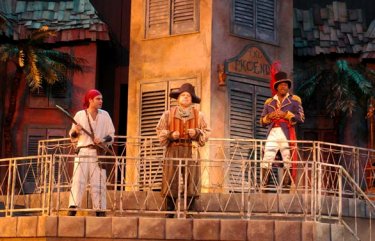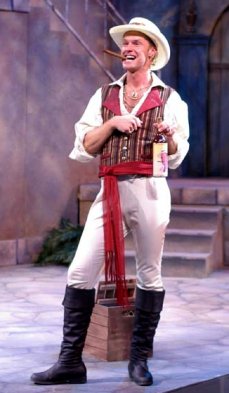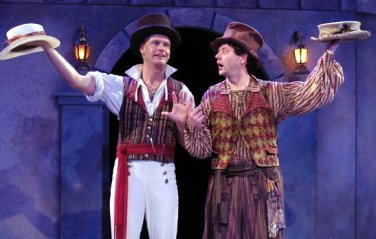Summary 
An outdoor production with a Caribbean theme - banana vendors, straw hats, bamboo and palm fronds amid lively Jamaican music and dancing - although slapstick comedy, including a chase by cartoonish pirates, is over-emphasized. Two actors double as the Antipholi and Dromios, one of each set macho and the other a wimp, and the confrontation finale is played for laughs with tricks, misdirection and pretending.
Design
Directed by Chuck Ney. Set and costumes by Michelle Ney. Lights by R. Lee Kennedy. Sound by Joe Court. Choreography by William McNeil.
Cast
Steve Pickering (Egeon), Grant Goodman (Antipholus), Andy Luther (Dromio), Kristy Hartsgrove (Adriana), Tiffany Scott (Luciana), Courtney Bohl (Courtesan), Wendell Franklin (Duke of Ephesus), Forest Van Dyke (Pinch).
Analysis

Director Chuck Ney creates a Caribbean milieu for the Illinois Shakespeare Festival's outdoor production of The Comedy of Errors. Ephesus - a sun-drenched island resort replete with banana vendors, a voodoo kiosk, strolling tourists in straw hats and parasols - also features a trio of slapstick pirates who sport eye-patches, gold teeth, hooks for hands, and comical snarls. The set features bamboo-like doors and windows beneath palm fronds, and natives dance to throbbing Jamaican-style music.
Scene changes include straw-skirt dancing routines and pirate chases as well as the bald-headed - and profusely perspiring - patriarch Egeon, enchained and desperate, followed by an axe-wielding headsman as he begs with a tin cup for donations from the audience. The broad slapstick is fast-paced and well-conceived, but this is an outdoor summer Festival and a production that is minimally rehearsed and performed only fourteen times (and in repertory with two other shows), so with less than perfect precision and whip-crack timing, the chases and races, fistfights and pratfalls become chaotic, look forced and become more a detriment than a value.

The multitude of scene changes contributes to the atmosphere but also facilitates quick costume adjustments, necessary because two performers portray four characters: the Antipholus and Dromio twins from both Ephesus and Syracuse. With the only distinguishable difference in the characters their hats and sashes, the two actors admirably differentiate the men: Antipholus of Ephesus is a frightened, flinching wimp while his twin from Syracuse is a bare-chested and cigar-chomping brute prone to posing with fists on hips; Dromio of Ephesus is a man-child given to sobs and wails while his Syracusan twin often lapses into angry blustering. The female characters seem mere window dressing, colorfully costumed and played with comparative understatement, but minimized within the context of the madcap mistaken identities.

The production, at times clumsy in execution, sometimes hits but mostly misses due to the overly broad Three Stooges comedy and silly physical humor, yet it still manages to occasionally charm. Ney's conclusion, however, is a series of palpable hits that elevates - one may even say "saves" - the production. With just two lead performers but four main characters, Ney has his two "missing" characters played as an inside joke. Antipholus and Dromio quickly switch hats with nearby performers and race from mark to mark to deliver lines as their twin counterparts, and sometimes they point and exclaim to misdirect the audience while they change places. When Pinch arrives there is a dizzying flinging of hats from all the characters across the stage to take attention away from the scrambling Antipholus and Dromio. And at one point, Dromio - alone onstage - shouts his lines, then changes hats and spins to shout back at "himself."
The final reunion plays with both twins heartily embracing the other, each actor holding a hat aloft where his twin should be standing. A charming and audience-pleasing conclusion, as indicated by the appreciative applause that greets Grant Goodman and Andy Luther at the curtain call.